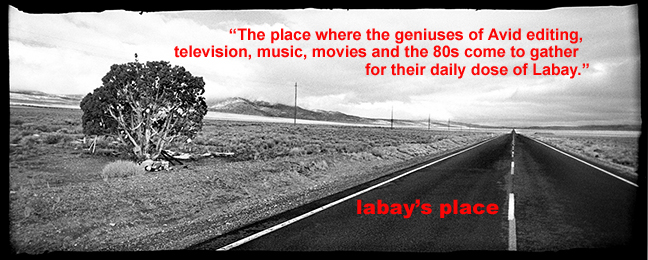(From The Avid Yahoo User's Group)
The perfect system is the one that lets you roll back time to the 80's where you could charge $700/hour for post edit time!
[Yeah, baby! And that's in 1980's dollars to boot!]
Seriously now, and before all you old editor's out there start to whine about how you hate "Linear On-Line" remember that good people back then (1980s) routinely made over
100 grand and worked for houses with bennies, vacations
and true engineers.
The complexities of CMX, CHYRON, ADO, KSCOPE, and
big switchers gave one plenty of job security back then.
Now all you have to contend with are the "spare bedroom and garage" edit shops.
In this new "new world" of editing, a lot of folks (clients and wannabe editors) jump into software-based solutions thinking it must be easy -- and then, when they realize that they have no idea what they are doing, try to get as much FREE help out of us editors as they can.
Just be a better cutter than the rest out there today and you can make your cash without all that "big iron" holding you down.
Nothing replaces solid talent, then or now.
As the saying goes, "just score more points and you will always win."
Talent will always wins out in the end.
Personally though, I'm glad that it no longer takes a million dollars to put together system that will execute a dissolve.
[Amen.]
There was, though a certain vetting of personnel that took place in those hardware intensive days and I rather miss the curmudeonly expert professionals who used to operate those systems. They at least understood that signal integrity mattered and that careful craft was essential.
The clients that sat in those rooms were likewise also more professional -- they had to be, in order to come up with the money to be there.
Like most technology revolutions, the explosion in toy cameras, toy editing systems, and toy formats have made certain good things possible -- but it's also opened the door to those people who think that anyone who casts a shadow on a sunny day qualifies to be a filmmaker.
Sure there are huge amounts of talented kids out there playing with all sorts of cheap gear and sure loads of talent is going to emerge from that.
The clear advantage we have as editors is we understand the business of editing. If an editor came out of a post house or linear on-line environment then they have loads of experience with tape machines and workaround solutions from being in different situations. I hate having to explain timecode fundamentals and TV basics to young new editors.
I knew many editors (operators, really) who made big bucks simply because they could make a big SONY switcher work with with two D2 machines and a DME. Not because of any specific creative talent. They were just doing their job.
However, one thing we must look at today is maybe the value of TV and film editors has come to a realistic point based on more equal competition, not the fact that one person has a bigger resume than another.
The addition of competition generated by non-linear edit systems has leveled the playing field and allowed for creative talent and experience to rise to the top.
On a broader scale, you're also seeing the effects of automation.
Editors that could make that big SONY switcher work with two D2 machines have been replaced by lines of code in the non-linear software.
That means the skills that are harder to quantify, such as "getting along with clients," or "good sense of rhythm" or "nice hair" are the ones that editors are being judged on.
[Sounds familiar.]
For example, someone who can do CAD does not necessarily have the skills to draw with pencil and paper.
Point being -- there aren't too many jobs today that are immune from being automated in some way.
So unfortunately, all those skills that took a long time to learn, and are enjoyable to put to use, will likely be pointless in 5-10 years.
Adapt or starve, apparently.
Subscribe to:
Post Comments (Atom)


No comments:
Post a Comment